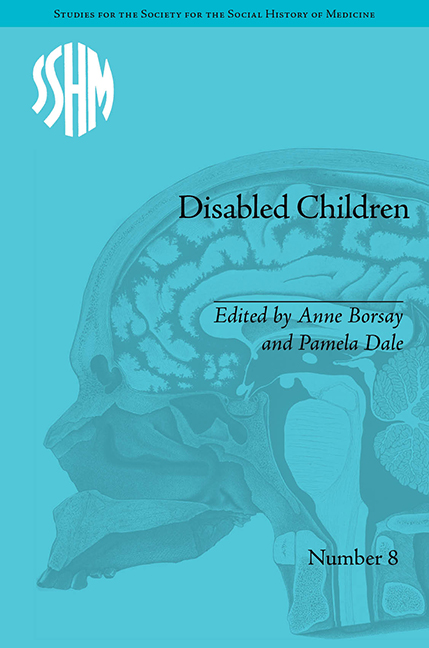Book contents
- Frontmatter
- Contents
- Acknowledgements
- Notes on Contributors
- Introduction: Disabled Children – Contested Caring
- 1 Club Feet and Charity: Children at the House of Charity, Soho, 1848–1914
- 2 Insanity, Family and Community in Late-Victorian Britain
- 3 The Mixed Economy of Welfare and the Care of Sick and Disabled Children in the South Wales Coalfield, c. 1850–1950
- 4 The Question of Oralism and the Experiences of Deaf Children, 1880–1914
- 5 Exploring Patient Experience in an Australian Institution for Children with Learning Disabilities, 1887–1933
- 6 From Representation to Experience: Disability in the British Advice Literature for Parents, 1890–1980
- 7 Treating Children with Non-Pulmonary Tuberculosis in Sweden: Apelviken, c. 1900–30
- 8 Health Visiting and Disability Issues in England before 1948
- 9 Spanish Health Services and Polio Epidemics in the Twentieth Century: The ‘Discovery’ of a New Group of Disabled People, 1920–70
- 10 Cured by Kindness? Child Guidance Services during the Second World War
- 11 Education, Training and Social Competence: Special Education in Glasgow since 1945
- 12 Hyperactivity and American History, 1957–Present: Challenges to and Opportunities for Understanding
- Notes
- Index
Introduction: Disabled Children – Contested Caring
- Frontmatter
- Contents
- Acknowledgements
- Notes on Contributors
- Introduction: Disabled Children – Contested Caring
- 1 Club Feet and Charity: Children at the House of Charity, Soho, 1848–1914
- 2 Insanity, Family and Community in Late-Victorian Britain
- 3 The Mixed Economy of Welfare and the Care of Sick and Disabled Children in the South Wales Coalfield, c. 1850–1950
- 4 The Question of Oralism and the Experiences of Deaf Children, 1880–1914
- 5 Exploring Patient Experience in an Australian Institution for Children with Learning Disabilities, 1887–1933
- 6 From Representation to Experience: Disability in the British Advice Literature for Parents, 1890–1980
- 7 Treating Children with Non-Pulmonary Tuberculosis in Sweden: Apelviken, c. 1900–30
- 8 Health Visiting and Disability Issues in England before 1948
- 9 Spanish Health Services and Polio Epidemics in the Twentieth Century: The ‘Discovery’ of a New Group of Disabled People, 1920–70
- 10 Cured by Kindness? Child Guidance Services during the Second World War
- 11 Education, Training and Social Competence: Special Education in Glasgow since 1945
- 12 Hyperactivity and American History, 1957–Present: Challenges to and Opportunities for Understanding
- Notes
- Index
Summary
The essays in this volume span many countries and different time periods, but they are united by a common set of approaches to childhood disability. These stem from seeing experiences as the outcome of personal circumstances and social structures, and offer an experiential critique of the dominant ‘social model’ originating in disability studies and developed within materialist histories of disability. The ‘social model’ tends to emphasize ‘disabling’ factors contributing to the exclusion of disabled people from the mainstream of society and contrasts with ‘individual models of disability’ that rely on notions of personal impairment. The intention of this volume is to develop a sense of contested caring. Rather than concentrate on the role of institutional factors contributing to disability the focus is on exploring how they shaped experiences of childhood disability in a variety of complex, unpredictable and sometimes contradictory ways. The book explores the varied, but distinctive, experiences of disabled children through their interaction with a range of specialist educational (Chapters 4 and 11) and medical services (Chapters 1, 2, 5, and 7–10). Provision for disabled children initially evolved in an institutional context (see Chapters 1–5, 7 and 9) and such segregated care often involved lengthy separations from families and communities. Over time the reach of these services was extended, and care was offered in new ways.
- Type
- Chapter
- Information
- Disabled ChildrenContested Caring, 1850–1979, pp. 1 - 14Publisher: Pickering & ChattoFirst published in: 2014



